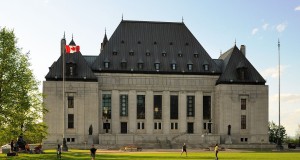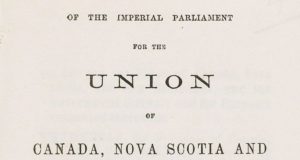In the wake of the Supreme Court of Canada’s decision in Vavilov, I’ve decided to pick up a copy of A.V. Dicey’s Introduction to the Study of the Law of the Constitution. I had read passages from this book more than a decade ago when I was in law school, but very little since beyond the odd paragraph. Dicey’s book is valuable primarily as a historical work. It lays ...
Read More »Tag Archives: judicial review
Vavilov: A Step Forward
Today, the Supreme Court of Canada released its decisions in Vavilov and Bell/NFL. I have previously summarized the facts of these cases and analyzed them here (Vavilov) and here (Bell/NFL). Overall, today’s decisions (a 7-2 decision, Abella and Karakatsanis JJ concurring in result) are a net positive for the law of judicial review in Canada. The Court has done a ...
Read More »Deference to Administrators Must be Legislated not Assumed
Earlier this month, Mark Mancini wrote two very thoughtful blog posts on the Double Aspect blog, attempting to bring administrative law back to first principles. These intriguing posts are worthy of commentary. I will respond to Mancini’s two posts today, and follow up next week with an addendum in light of the Supreme Court of Canada’s recent decision in Canada ...
Read More »The Administrative Law “Trilogy”: The Stare Decisis Trap
This week, the Supreme Court of Canada finally heard the consolidated appeals in Bell/NFL and Vavilov. ARL, expertly represented by Adam Goldenberg, put forward our submissions on the matter, which focus on a return to the basis of the law of judicial review: its statutory character. During the hearings, one particular line of questioning posed a problem for this argument, ...
Read More »Protecting Rights: A Common Responsibility
“Are great public problems best addressed through institutions designed to apply the explicit technical knowledge of experts or by those designed to channel the implicit social knowledge of the community?”[1] Since the enactment of the Charter of Rights and Freedoms, Canada has experienced a remarkable shift from the latter forum to the former—namely, from legislature to courtroom.[2] Not only has ...
Read More »The Wall of Separation
The Supreme Court of Canada released its judgement in the Wall appeal last week. It’s a victory for clarity in what had become quite a confused case. The Court, overturning both courts below, ruled that judges do not have authority to review the decision of an unincorporated religious body to expel one of its members. Confusion at the lower courts Randy Wall, the ...
Read More »RIP Reasonableness
The Supreme Court recently issued its decision in Quebec (Commission des normes, de l’équité, de la santé et de la sécurité du travail) v Caron, 2018 SCC 3, which may, or may not, be another sign that the Court’s love affair with deference to administrative decision-makers is coming to an end ― in practice if not yet in theory. I ...
Read More »Getting Back to the Basics of Judicial Review
One could scarcely find an area of law so muddied as administrative law. In a recent blog post on Double Aspect, Leonid Sirota argues (omitting some far more colourful language) that our courts continue to struggle with reconciling the basic concepts of parliamentary supremacy and the rule of law, which are said to be in conflict with one another. The ...
Read More »The Courts Have No Jurisdiction to Review “Church Discipline”
Can a matter of church discipline be appealed from a church to a court? The question has made its way up to the Supreme Court of Canada in Wall v Judicial Committee of the Highwood Congregation of Jehovah’s Witnesses. It may surprise you that it was answered in the affirmative by the chambers judge, Justice Wilson, and by a majority ...
Read More »Not Just A Pillowfight: How the SCC Has Muddied the Standard of Review
Recently, Justice David Stratas of the Federal Court of Appeal released an extremely helpful summary of almost every aspect of administrative law in Canada. Administrative law students, practitioners, and academics would be well-served to carefully read the document. But Justice Stratas’ piece is far from merely descriptive—in it, he provides a number of recommendations for a return to sound and ...
Read More » Advocates for the Rule of Law
Advocates for the Rule of Law









